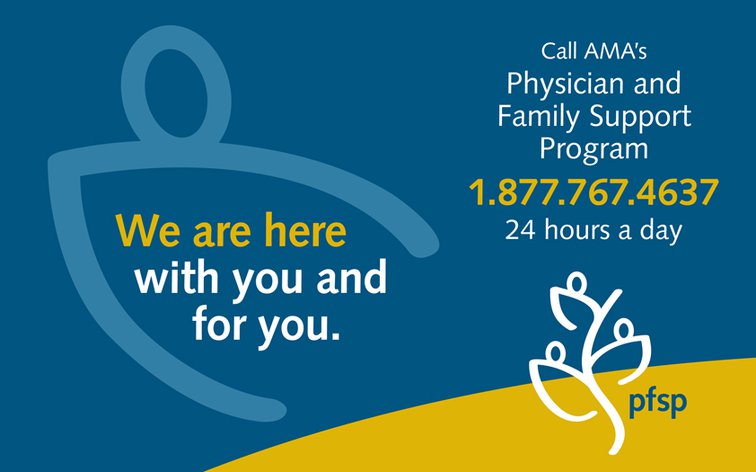“My humanity is bound up in yours, for we can only be human together.”
I was diagnosed with multiple sclerosis halfway through general internal medicine residency and took on being a physician alongside navigating a chronic illness. I did this – I felt successfully – by hiding my struggles from those around me. I hid it through having three children in residency and during the first 10 years of practice.
I felt that to be a physician I had to be strong, perfect, infallible and able to operate optimally without sleep and without self-reflection. A lot of us do this. I thought that I successfully ignored my personal needs while I catered to my career, my family and my patients. I was trained this way, and I felt that it worked.
Despite some struggles, I took it upon myself to continue to build my career without significant outside help. I remember driving home from nights on call, completely exhausted. My kids were in bed, and I knew that I was up again at 7 a.m. to start another full day. I would often be in tears with minimal sleep. I would re-group and, again, I felt I did a good job. I talked to my colleagues on a superficial level, and I thought that this was an adequate connection. My patients got excellent care, and my students were happy. I figured that this was success.

I think back on this strategy, of forging forward through my career with only myself to rely on, with some regret. I made assumptions and continued the tradition of soldiering on although it was a lonely struggle. This method denied me and my colleagues an opportunity to benefit from deeper connections that we might have built to know each other better and to rely on each other. Without those deep connections, I went through a lot of difficult moments in my career. We all have those types of stories to tell. I don’t feel that a physician can practice medicine without facing a lot of tough things. I got to a point in my career where I felt stuck and could not keep going on my own.
During my medical school training, over 25 years ago, we didn’t talk much about supports for physicians, and I didn’t know who to turn to. In 2023, we have physician support programs and whole sections of our health system dedicated to physician wellness. We have certified coaches in many specialty areas, mentors and leadership programs. None of these were prominent in my world in the 2000s, but I had heard about mentors. I went through a particularly difficult bump in my career, and someone suggested that I should look for a mentor. So I did. I found a mentor, someone I knew and trusted, who asked the most illuminating questions: questions that focused on what I needed not what I was lacking. Despite not knowing the ins and outs of physician supports, I was finding some help.
The physician-leader I turned to with my troubles wasn’t a formal coach, but I saw them as a friend. I knew this person, and they knew me. This is often how physicians start to get help in their work environments. In retrospect, what a great example this was of how important it is that we know each other more deeply. It was probably the first time that I shared my true feelings and experiences in my job setting. They asked what mattered to me, what I valued and what my goals were. Having someone in the workplace who really knew the details of what I was experiencing was critical.
Being vulnerable with just one colleague was a turning point. This started a personal tsunami of exploration, sharing with others, and honouring myself in my physician world. I learned that we are not alone with our struggles and insecurities. I realized that our own actions and assumptions can contribute to keeping us apart from each other. I realized that I achieved more of that was meaningful to me by sharing my vulnerabilities and humanity with my colleagues than I did by hiding them. I began to realize that it is not only someone that you know already who can support you in the world of health care. There are people out there who can be your advocates and who can really make your workplace a better place.
My career has grown exponentially from this point, and this understanding has been a pillar: knowing that we can find trust in the system and that with that trust, we can prosper. There are people out there who want to know you, trust in that.
Call to action
Be vulnerable and share your experiences. Be optimistic that you will be well received in this. Talk to your colleagues and learn from the differences in how we behave, how we use our skills and what skills we are lacking, especially when facing adversity. Get to know each other and learn from our successes and struggles. Do this without judgement but with an eye of optimism, growth and support so that we can thrive in this worthy profession. By deeply knowing each other, we will craft a better workplace for all.
For those who appreciate literature resources:
Peter A. Schein, Edgar H. Schein. Humble Leadership: The power of relationships, openness, and trust. 2018 Berrett and Koehler Publishers.
Roel van der Heijde and Dirk Deichmann. Why Healthcare Leaders Should Share their Vulnerabilities. December 12, 2019 https://knowledge.wharton.upenn.edu/article/health-care-leaders-share-vulnerabilities/ Accessed July 18 2023.
Paul Thomas. Health is wisely sharing vulnerability. London J Prim Care (Abingdon). 2016; 8(3): 33–34. Published online 2016 Jun https://www.ncbi.nlm.nih.gov/pmc/articles/PMC5330328/
Banner image credit: Sven Lachmann, Pixabay.com

